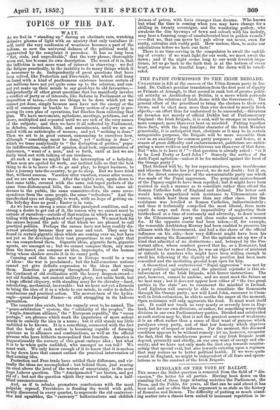THE PAPIST COMMISSION TO THE IRISH BRIGADE. 1JrruesritEss is felt
at the success of the Ultra-Roman party in Ire- land. Dr. Cullen's peculiar translation from the first post of dignity as Primate at Armagh, to that second in rank but of greater politi- cal activity as Archbishop at Dublin, is a move which portends change in the relations of Irish Rome with the Government. The general effort of the priesthood to bring the electors to their own views, and to elect men more than ever devoted to merely Irish objects,—an effort thus far understood to be sucoessful,—threatens an invasion not merely of official Dublin but of Parliamentary England: the Irish Brigade, it is said, will be stronger in numbers, more compact, more than ever bent on mischief. Putting together these facts, with the long familiar character of the Irish Member generically, it is anticipated that, obstinate as it may be in certain antagonistic) purposes, the Brigade will be more accessible than ever as an auxiliary for common party purposes ; and hence, at a season of great difficulty and embarrassment, politicians are antici- pating a more reckless and mischievous use than ever of that force. But " who is to have it ? "—that question is already asked : " is it to be Lord Derby or Lord John ? " Scarcely the author of the Anti-Papal agitation—unless it be for mischief against the head of the Orange party ? That Ireland will be, by her representatives, more troublesome and irksome than she has yet proved, we do not doubt ; but if so, it is the direct consequence of the unwarrantable party use which was made of the Papal aggression. The perpetual encroachment of the Papacy ought to have been repelled; but it might have been resisted in such a manner as to conciliate rather than offend the Roman Catholics both of England and Ireland. The better sort would have sympathized with resistance to Ultramontane ad- vances, which hurt them more than any other class. But the resistance was levelled at Roman Catholics, indiscriminately ; and thus it technically compelled the most liberal, from mere esprit de corps and from the impossibility of neglecting their brotherhood at a time of contumely and adversity, to draw nearer to the Ultramontane party and close ranks against a common foe. If the opposite course had been taken,—if, for example, the venerable Archbishop Murray had been enabled to preserve his alliance with the Government, and had a due share of the official influence on his side,—how very different might have been his position among the Romanists ! But the agitation set up was of a kind that admitted of no distinctions ; and, betrayed by the Pro- testant allies, whose conduct proved that he, as a Romanist, had advanced too far to meet them, he was an object rather of mistrust or ridicule to numbers who might have been willing enough to swell his following if the dignity of his position had been more consulted and the mediating ground kept open for him.
A theoretical and controversial " Papal aggression" was met by a party political agitation ; and the practical rejoinder is this re- inforcement of the Irish Brigade, with fiercer instructions. The past, however, cannot be undone, and we must meet the future as we best may ; but it does not appear how either of "the two great parties in the state " are to counteract the mischief in Ireland. Lord Eglinton will scarcely be able to conciliate the Romanists through the Orange party ; nor will Lord John, successor to Crom- well in Irish estimation, be able to soothe the anger at the moment. Open resistance will only aggravate the feud. It must work itself out. It could not touch us very nearly or severely here in Eng- land, but for our own divisions, or rather, for something worse than division in our own Parliamentary parties. Divided and subdivided as each section may be, that is not the greatest source of weakness; it is an effect rather than a cause of that want of purpose which paralyzes every party, and of that low honesty which deprives every party of respect or influence. For the moment, this diseased condition appears to be without remedy: let us, however, recognize the fact, that the mischievous power of any Irish Brigade must depend, primarily and chiefly, on our own want of energy and sin- cerity, and we have not only made the first step towards counter- acting that special evil, but also towards entering upon a regimen that may restore us to better political health. If we were quite sound in England, we might be independent of all fears and specu- lations as to the conduct of the Irish Brigade.


























 Previous page
Previous page